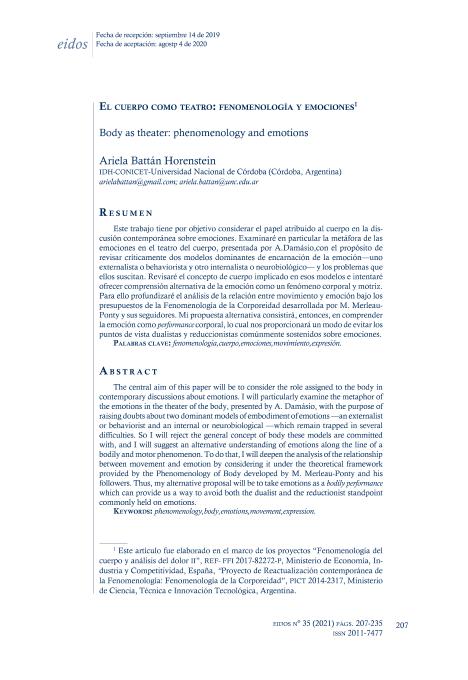Mostrar el registro sencillo del ítem
dc.contributor.author
Battán Horenstein, Ariela

dc.date.available
2021-11-10T20:55:13Z
dc.date.issued
2020-12
dc.identifier.citation
Battán Horenstein, Ariela; El cuerpo como teatro: fenomenología y emociones; Universidad del Norte. Departamento de Humanidades y Filosofía; Eidos; 35; 12-2020; 207-235
dc.identifier.issn
2011-7477
dc.identifier.uri
http://hdl.handle.net/11336/146622
dc.description.abstract
Este trabajo tiene por objetivo considerar el papel atribuido al cuerpo en la discusión contemporánea sobre emociones. Examinaré en particular la metáfora de las emociones en el teatro del cuerpo, presentada por A.Damásio,con el propósito de revisar críticamente dos modelos dominantes de encarnación de la emoción—uno externalista o behaviorista y otro internalista o neurobiológico— y los problemas que ellos suscitan. Revisaré el concepto de cuerpo implicado en esos modelos e intentaré ofrecer comprensión alternativa de la emoción como un fenómeno corporal y motriz. Para ello profundizaré el análisis de la relación entre movimiento y emoción bajo los presupuestos de la Fenomenología de la Corporeidad desarrollada por M. Merleau-Ponty y sus seguidores. Mi propuesta alternativa consistirá, entonces, en comprender la emoción como performance corporal, lo cual nos proporcionará un modo de evitar los puntos de vista dualistas y reduccionistas comúnmente sostenidos sobre emociones.
dc.description.abstract
The central aim of this paper will be to consider the role assigned to the body in contemporary discussions about emotions. I will particularly examine the metaphor of the emotions in the theater of the body, presented by A. Damásio, with the purpose of raising doubts about two dominant models of embodiment of emotions —an externalist or behaviorist and an internal or neurobiological —which remain trapped in several difficulties. So I will reject the general concept of body these models are committed with, and I will suggest an alternative understanding of emotions along the line of a bodily and motor phenomenon. To do that, I will deepen the analysis of the relationship between movement and emotion by considering it under the theoretical framework provided by the Phenomenology of Body developed by M. Merleau-Ponty and his followers. Thus, my alternative proposal will be to take emotions as a bodily performance which can provide us a way to avoid both the dualist and the reductionist standpoint commonly held on emotions.
dc.format
application/pdf
dc.language.iso
spa
dc.publisher
Universidad del Norte. Departamento de Humanidades y Filosofía
dc.rights
info:eu-repo/semantics/openAccess
dc.rights.uri
https://creativecommons.org/licenses/by-nc/2.5/ar/
dc.subject
EMOCIONES
dc.subject
CUERPO
dc.subject
TEATRO
dc.subject.classification
Otras Filosofía, Étnica y Religión

dc.subject.classification
Filosofía, Ética y Religión

dc.subject.classification
HUMANIDADES

dc.title
El cuerpo como teatro: fenomenología y emociones
dc.title
Body as theater: phenomenology and emotions
dc.type
info:eu-repo/semantics/article
dc.type
info:ar-repo/semantics/artículo
dc.type
info:eu-repo/semantics/publishedVersion
dc.date.updated
2021-09-06T15:41:06Z
dc.journal.number
35
dc.journal.pagination
207-235
dc.journal.pais
Colombia

dc.journal.ciudad
Barranquilla
dc.description.fil
Fil: Battán Horenstein, Ariela. Universidad Nacional de Cordoba. Facultad de Filosofia y Humanidades. Centro de Investigaciones; Argentina. Consejo Nacional de Investigaciones Científicas y Técnicas. Centro Científico Tecnológico Conicet - Córdoba. Instituto de Humanidades. Universidad Nacional de Córdoba. Instituto de Humanidades; Argentina
dc.journal.title
Eidos
dc.relation.alternativeid
info:eu-repo/semantics/altIdentifier/url/https://rcientificas.uninorte.edu.co/index.php/eidos/article/view/12431
Archivos asociados
